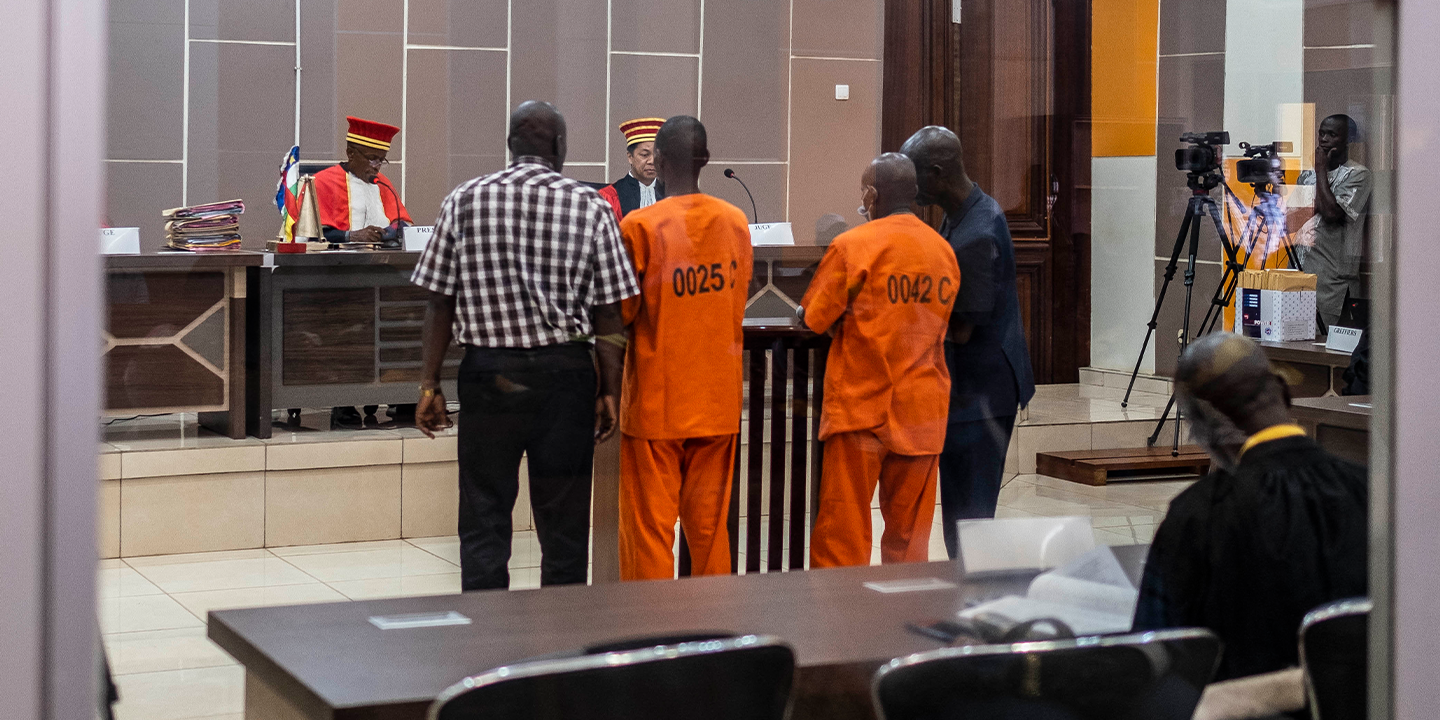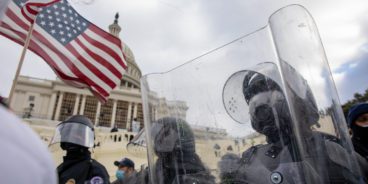
George Orwell versus Donald J. Trump’s “Muslim Ban”
In 1940 George Orwell, the century’s most famous literary opponent of totalitarianism, lifted his portentous pen to review Adolf Hitler’s “Mein Kampf.” In just a few serrated lines Orwell exposed several truths regarding the threat that a joyless and malevolent narcissist like Hitler posed to democracy. The first was that Hitler always spoke and wrote in a way that if “he were killing a mouse he would know how to make it seem like a dragon.” Hitler invariably presented himself and his supporters as victims, battling iniquitous enemies and “suffering under intolerable wrongs.”
The second observation was that there will always be a certain constituency of voters in western democracies who desire not just comfort and security, but also “drums, flags and loyalty parades.” In the midst of the Great Depression, Hitler promised such people both economic salvation and paramilitary pageantry, and as a result “a whole nation flings itself at his feet.”
Orwell was no casual commentator. He had fought on the republican side of Spain’s civil war, where he was shot by a fascist sniper. And in June 1940, just three months after he reviewed Hitler’s turgid autobiography, Paris had fallen and Orwell was preparing for Nazi Germany’s imminent invasion. In his diary, Orwell wrote that if England was conquered but the United States joined the Second World War, then “one must remain alive if possible, if necessary in a concentration camp.” But if the United States would not declare war against Hitler, then “there is nothing for it but to die fighting.”
I was reminded of Orwell’s words recently when another malignant narcissist, President Donald J. Trump, imposed a ban on refugees, immigrants and visitors from seven Muslim-majority countries from entering the United States. Trump wants to convince people that he is fighting the dragon of “radical Islamic terrorism.” He is doing no such thing. Instead he is scapegoating some of the most vulnerable people on earth, and undermining long established moral, legal and political principles.
Even the most elementary reading of the early history of the United States reveals how deeply committed the “Founding Fathers” were to secularism. They feared that sectarianism imperiled the nascent republic’s cohesion. Of all his achievements, the three Thomas Jefferson chose to chisel on his gravestone included his authorship of the Virginia Statute for Religious Freedom. But despite the constitutional separation of church and state, broad public acceptance of religious diversity – even amongst Christians – took generations to secure. For example, New York’s constitution of 1777 initially banned Catholics from public office, a prohibition that was not lifted until 1806.
That awkward and odious past returned with a vengeance on Friday, 27 January. President Trump’s executive order banned refugees, migrants and visitors from Libya, Iran, Iraq, Somalia, Sudan, Syria and Yemen from entering the United States. Despite its thin anti-terrorist pretense, the ban is grievously discriminatory and is clearly linked to Trump’s December 2015 campaign call “for a total and complete shutdown of Muslims entering the United States.”
According to the American Civil Liberties Union, President Trump’s executive order violates the Establishment Clause of the US Constitution. It may also breach the US Immigration and Nationality Act of 1965, as well as the international Refugee Convention, which states that parties shall accept refugees “without discrimination as to race, religion or country of origin,” and the 1967 Protocol, of which the United States is a signatory.
Three days after Trump’s 2015 speech, the US Senate Judiciary Committee passed a resolution stating that the government must never ban people “based on their religion, as such action would be contrary to the fundamental principles on which this nation was founded.” Those words were adopted by 16 votes to 4, with then Senator Jeff Sessions, now Trump’s Attorney General, voting nay. Given that more than 65 million people around the world are currently displaced by persecution, conflict and mass atrocities, the Republican-led Senate should reaffirm this position. Not least of all because for decades the United States has been the world’s top resettlement country for refugees, with more than 3 million being accepted since 1975.
Resettlement programs allow long-term refugees to get out of miserable displacement camps and rebuild their lives. Refugees cannot apply for permanent resettlement, but are chosen by the UN’s refugee agency. Eligible refugees who are selected for the US are then scrupulously vetted by 8 Federal Agencies, 6 different security databases, and subjected to numerous background checks, interviews and biometric testing. For this reason, the process takes years to complete.
The fact that President Trump’s ban was promulgated on International Holocaust Remembrance Day adds historical insult to executive injury. The Nazi’s mass murder of 6 million Jews was the moral nadir of the twentieth century. That so many Jewish asylum seekers were denied potential sanctuary by various western democracies during the 1930s is a source of enduring shame. Several commentators have pointed to the experience of the St. Louis, a transatlantic liner that sailed from Hamburg in May 1939 carrying over 900 Jews fleeing Nazi persecution. Most applied to enter the United States but were denied visas and sent back to Europe. Around a quarter of the St. Louis’ passengers – 254 men, women and children – later perished in the Holocaust.
An even more telling story, but less well known, is that of Herbert Karl Friedrich Bahr. In the summer of 1942 Bahr joined a “mercy ship” of Jewish refugees sailing from Sweden to New York. Bahr, posing as a Jew, was uncovered as a German Nazi agent who had been recruited to set up a spy ring in the United States. His espionage trial was widely covered in the national newspapers and bolstered the argument that Jewish refugees constituted a national security threat. In Bahr, anti-Semitism and anti-refugee sentiment found a convenient, if callous, riposte to arguments for compassion.
Bahr’s case finds a historical echo in President Trump’s assertion that ISIS terrorists may masquerade as Syrian civilians fleeing atrocities and sneak into the United States. Such suggestions ignore the vigorous vetting that refugees undergo, and inflicts collective punishment upon millions of desperate people for the potential crimes of a few homicidal fanatics. But this is not 1942, and Americans will not be so easily fooled this time around.
Nevertheless, President Trump’s executive order, along with his recent denunciations of the free press and the judiciary, pose a perilous threat to democracy. For the first time since the end of Jim Crow in the American South, unvarnished white supremacists sit in the Oval Office guiding the hand of the President of the United States.
Internationally, authoritarianism is already ascendant in Russia, Turkey, the Philippines and elsewhere. In a few months time the Netherlands and France face the potential election of far right politicians who want to hollow out democracy and dismantle the European Union. If Geert Wilders or Marine Le Pen win power, the United Nations and the entire international order that was constructed in the aftermath of World War Two will face an existential crisis.
But now is not the time for despair. The fanatical fringes of European politics – including nouveau fascists and full blown Holocaust deniers – have rejoiced over Trump’s election and his “Muslim ban.” But those hundreds of thousands who have protested and spontaneously gathered outside US airports and courthouses, as well as the judges, journalists and others who are standing up for the rule of law, can still knock the wind out of his demagogic lungs. Over the last two weeks they have inspired countless other people who have marched in London, Berlin, Paris, The Hague, Nairobi, Cape Town and around the world. Regardless of whether President Trump’s shameful and illegal ban on Muslims is rescinded, all supporters of human rights and humanitarianism must urgently commit themselves to the defeat of Wilders, Le Pen and their local acolytes.
As I write, “1984” has risen to number two on Amazon’s bestsellers list. It is no wonder that in these dark days of “alternative facts,” fake news and creeping authoritarianism, people should turn again to Orwell. In the Appendix to his most enduring novel, Orwell wrote that there were some phrases that would be impossible to translate into “Newspeak,” his imagined language of totalitarianism. These included the opening lines of the US Declaration of Independence that Jefferson drafted. Almost seventy years after the publication of “1984,” that is a thought worthy of further contemplation. President Trump is not alone in his bigotry, but many millions more people across America and around the world still hold certain unalienable rights and truths to be self-evident, and remain determined to defend them.
Related Content


Central African Republic Appropriations Letter FY24
